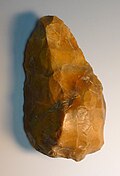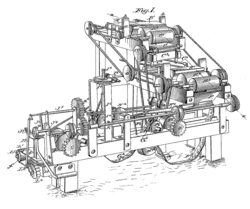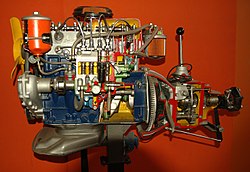Machine
A machine is a thing that is created by people to make work easier. It is a tool or invention which multiplies the effect of human effort. The machine produces a mechanical advantage.
Some machines have many parts that move. Examples are bicycles and clocks.
Some machines do not have parts that move. Examples are computers and telephones.
People have used machines since before there was history.
Often a machine will change one form of energy to another form of energy. Simple machines increase or change the direction of a force.
Simple machine
There are six 'simple machines'. They are:
- the wedge,
- the Inclined plane (ramp),
- the screw,
- the lever,
- the pulley,
- and the wheel and axle.
Compound machines are made up of two or more simple machines.
Machine Media
A worker operating a milling machine in the early 20th century
A flint hand axe was found in Winchester.
Chambers' Cyclopædia (1728) has a table of simple mechanisms. Simple machines provide a "vocabulary" for understanding more complex machines.
The Kinematics of Machinery (1876) has an illustration of a four-bar linkage.
Early Ganz Electric Generator in Zwevegem, West Flanders, Belgium
The Antikythera mechanism (main fragment)










